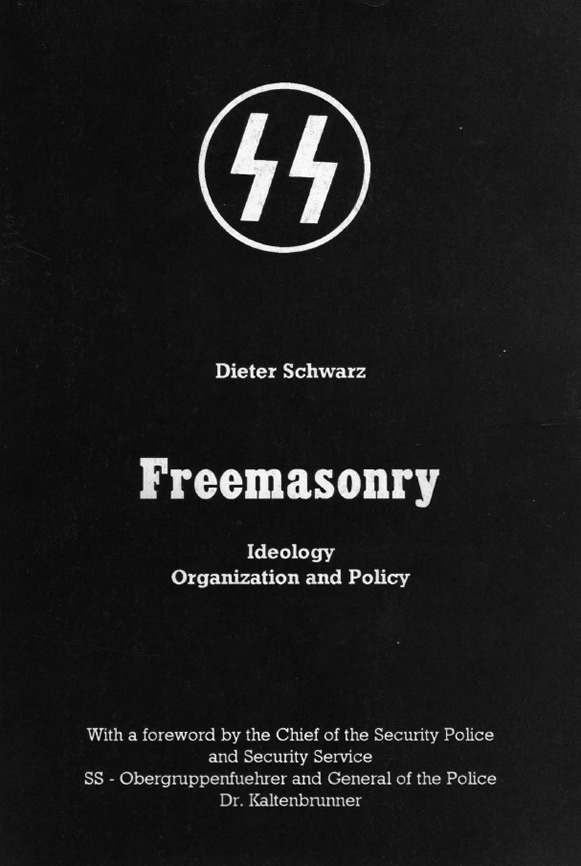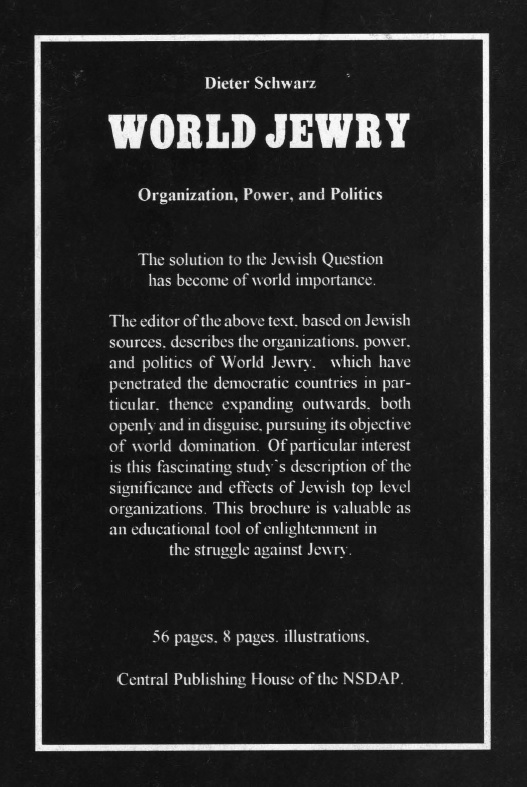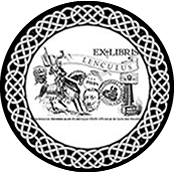
Dieter Schwarz - Freemasonry
Ideology Organisation, and policy
With a foreword by the Chief of the Security Police and Security Service
SS - Obergruppenfuehrer and General of the Police Dr. Kaltenbrunner
Berlin 1944 - Central Publishing House of the NSDAP
PART I : HISTORICAL FOUNDATIONS
Chapter 1. The Jewish Oriental Foundations
1. The Jewish oriental foundations
Chapter 2. Development Of Freemasonry Outside Germany In The 18th Century
1. Development out of the English working lodges in the 17th and 18th centuries (nonguild members in the stone cutters guilds - origin of the word Freemason - the Grand Lodge Of London in 1717 - the Ancient Duties)
2. The development of Freemasonry in France (the Enlightenment and thought of the French Revolution - the penetration of Jews into the English and French lodges - Jewish institutions in the higher degrees)
Development of Freemasonry in Germany up to the emancipation of the Jews
a) The English line of influence
b) The Romanic line of influence
c) The development of German Freemasonry along the lines of speculative philosophy (German idealism in the 18th century - change in the meaning of Freemasonry - Goethe and Freemasonry - the age of the German Wars Of Liberation)
Chapter 3. Development Of Freemasonry In The 19th And 20th Century
1. The participation of Freemasonry in the Revolutions of 1789, 1830, and 1848 (the Masonic mission of France - Democracy and Republic - the Restoration - 1830 - 1848 - Napoleon III and the Masonic opposition)
2. Penetration of the Jews into bourgeois society with the help of the lodges (struggle of the Jews for equality - Masonic humanitarianism and tolerance on the Jewish Question - The Jewish lodge in Frankfurt am Main in 1807 - Admission of Jews at Birkenfeld in 1845)
3. Developments outside Germany from 1870 to 1914
4. The attitude of German Freemasonry during this period
Chapter 4. International Freemasonry And The World War
1. The attitude of the lodges in the Entente States (slander of Germany and its allies - Masonic Congresses - Masonic peace propaganda)
2. Attitude and opinions of Freemasons in Germany (influence of the lodges and their work of corruption - Internationalist thought - The Field Lodges)
PART II : ORGANISATION, WORKING METHODS, AND AIMS OF FREEMASONRY
Chapter 1. Organisation
1. The John Lodges as the lowest degree
2. The higher degree lodges
3. The connection between John Freemasonry and Higher Degree Freemasonry
4. Supranational organisations of Freemasonry
5. Masonic organisations in Germany, former Austria, former Czechoslovakia, and former Poland :
a) in Germany
b) in former Austria
c) in former Czechoslovakia
d) in former Poland
Chapter 2. Organisations Similar To Freemasonry
1. Odd Fellows
2. Order Of Druids
3. Schlaraffia
4. Rotary Club
Chapter 3. Disguised Work Of Freemasonry In Other Organisations
1. Disguised work of Freemasonry in other organisations
Chapter 4. Ideological Aims
1. The basic concepts of Freemasonry (humanitarianism and tolerance - international chain of brotherhood - denial of racial and national differences - Masonic cosmopolitanism, liberalism, and democracy)
2. Educational methods of Freemasonry (aims of education - effects and methods of Masonic education - ritual - symbolism - Masonic speeches, signs, and building blocks - Masonic writings)
Chapter 5. Relationship Between Freemasonry And Other Supranational Powers
1. Freemasonry and the Church (Freemasonry as anti Church - struggle between Catholicism and Freemasonry - Papal bulls banning Freemasonry - attempts at union - Conference of Aachen of 1928)
2. Freemasonry and Jewry
3. Freemasonry and Marxism (Freemasonry as the bourgeois, democratic liberal vanguard of Marxism - Communism and Freemasonry - Masonic statements on Communism)
PART III : FREEMASONRY AS A FORM OF OPPOSITION TO NATIONAL SOCIALISM
Chapter 1. Freemasonry And Fascism
1. Freemasonry and Fascism (Fascism's struggle against the Green Snake - Anti Freemasonry Law of 1925 - Grand Master Torrigiani against Fascism - Mussolini on Freemasonry)
Chapter 2. Freemasonry And National Socialism
1. National Socialist Leaders on Freemasonry (Adolf Hitler - Alfred Rosenberg - Hermann Güring - Reich Leader Buch)
2. Decrees and Directives of branches of the State and Party against the lodges, and of the Party against Masonic lodges and organisations in Germany
3. National Socialism's struggle against Freemasonry (voluntary dissolution of the lodges, the attitude of the old Prussian lodges - lodge defence committees)
4. World Freemasonry's struggle against National Socialism (topics of discussion at Masonic and emigrant congresses - boycott propaganda - the work of the People's Front)
5. Summary (irreconcilable conflict between National Socialism and Freemasonry)
Dieter Schwarz - PDF

Forward To The 1st, 2nd, 3rd, And 4th Editions
The intent of the present work is to deal with the principal problems of Freemasonry in a concise manner. It makes no claim to completeness; rather, it intends to provide documentation based on authentic materials from the archives of the Security Service of the Reich Leader Of The SS and Secret State Police, thereby educating the public to the danger posed by Freemasonry over the past several centuries. A detailed description of the irreconcilable conflict between the ideology of Freemasonry and that of National Socialism, based on the fullness of the available archive material, must be left to later works.
Heydrich SS-Obergruppenführer - 1938.
Forward To The 5th Revised Edition
In 1942, World Freemasonry celebrated the 225th anniversary of its founding. Like the 200th anniversary, the 225th anniversary was celebrated during wartime -- during a war for which World Freemasonry was once again partly responsible. But how different is the situation of Freemasonry compared to 1917! Then, it stood at the height of its influence and enjoyed immeasurable political power. Today, by contrast, it is being called upon to render an account : the healthy Folks of Europe have overcome the corrupting poison of the Masonic ideology; the powerful forces of Freemasonry have suffered serious reverses, and must furthermore expect that their days are numbered in Europe.
Political developments since the publication of this text have confirmed the correctness of the statements made in it. Once again, World Freemasonry has given rise to forces directed against all racially healthy movements, simultaneously creating the impetus for a total extinction of those movements.
An awareness that the rejuvenated Folks of Europe must remain alert to the disintegrating corruption of liberal Masonic thought in order to prevent any regrouping and renewed grab for power, has impelled the author to publish a revised and supplemented edition for the German and European Folks, in order to make a small contribution to the total spiritual healing of the European community of Folks.
Dieter Schwarz - 1942.
Forward To The 6th Edition
Among the spiritual forces secretly working in the camp of Germany's enemies and their allies in this war, as in the last, stands Freemasonry, the danger of whose activities has been repeatedly stressed by The Leader in his speeches.
The present brochure, now made available to the German and European Folks in a 6th edition, is intended to shed light on this enemy working in the shadows. Though an end has been put to the activities of Masonic organisations in most European countries, particular attention must still be paid to Freemasonry, and most particularly to its membership, as the implements of the political will of a supragovernmental power. The events of the summer of 1943 in Italy demonstrate once again the latent danger always represented by individual Freemasons, even after the destruction of their Masonic organisations. Although Freemasonry was prohibited in Italy as early as 1925, it has retained significant political influence in Italy through its membership, and has continued to exert that influence in secrecy. Freemasons thus stood in the first ranks of the Italian traitors who believed themselves capable of dealing Fascism a death blow at a critical juncture, shamelessly betraying the Italian Nation. The intended object of the 6th edition of this brochure is to provide a clearer knowledge of the danger of Masonic corruption, and to keep the will to self defence alive.
Dr. Kaltenbrunner SS-Gruppenfьhrer General Of The Police - 1943.



